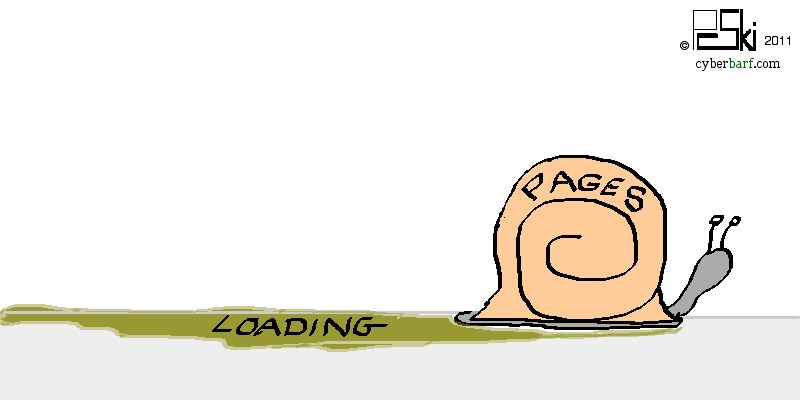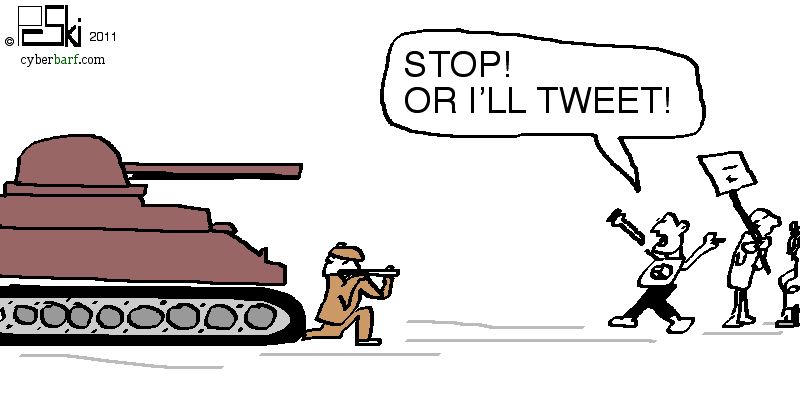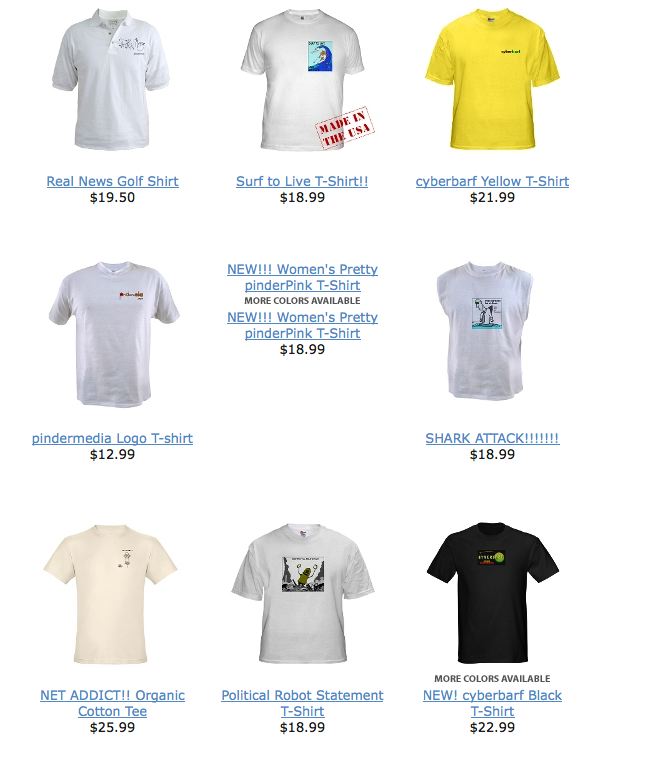cyberbarf
SNAIL
PACE
. . . . . . . . . .

A
spinning wheel of death, the browser cursor, spinning like a pinwheel
in a hurricane. In a high speed connection, too. Waiting. Waiting
for seemingly forever. The trend is that page loads are turning into
molasses of a 14.4 dial-up modem. And frustration is growing which
each non-response.
It
is time to equate this problem with early desk top publishing. The
power to self-create DTP newsletters and graphics flooded the internet
with graphically challenged nightmares of dozens of conflicting fonts,
poor page designs, dangling headlines, and poor content construction.
We
know the causes for these web page time-outs:
1.
looking for ad server;
2.
looking for facebook connection;
3.
loading video content.
Those
annoying pop up ads have now turned into even more annoying full screen
video ads where the (close) button is hidden from plain view. If a
page has more than two multimedia ad spaces, you are doomed to wait
until the bottlenecks and conflicts are resolved somewhere far, far,
far away from your terminal. It is like waiting a roulette wheel spin,
after its fifth minute of the ball hugging the top rail, to fall.
And it never falls on your number. The ads never do either.
Just
as teeth grinding is waiting for a facebook connection. What if you
don't care about facebook? What if you are not on facebook, as a matter
of principle or pride?? It seems like a Terminator type robotic device
to attempt to locate and destroy the human vermin that populate the
electronic planetary systems.
Like
overloaded DTP pages, there are pages that are just video windows.
Slow loading video windows. Overkill video window pages. You can't
smash your finger hard enough on the ESC key, but to little effect.
You are doomed to stall out, then crash in any browser.
It
is easy to get sucked into the Impatient Generation when web pages
load like a sand hourglass.
Just
because a page designer can throw all the bells and whistles, audio,
video, graphics and links on a single page, that does not mean he
or she should cram so much junk that an average user would rather
abort the page load and move on to an alternative site. And that is
what happens. If the page does not unfreeze after one re-set, it is
on to a different URL to find the same information or entertainment.
cyberbarf
FALSE
EMPOWERMENT PERCEPTION

The national media is crowing about the revolution in the Middle
East being caused by the power of social media. This is a false assumption.
The
real reason that Tunisia, Libya, Egypt and Yemen have turned into
centers of protest against their autocratic governments is simple:
high food prices (see, The Oil Economy), high unemployment, and corrupt
government officials. They are not shouting for democracy, but merely
change. Change is the form of a living wage, stable food prices, and
less corrupt officials.
The
boiling point of intolerance came when the educated and unemployed
youth in North Africa gave them no opportunity. The current system
was rigged against them. This was not a political movement but an
economic protest.
Technology
is only a tool to communicate instructions to protesters. But as one
Egyptian businessman said during the height of the protests, the elderly
women in the crowds of Tahrir Square were not “Internet literate.”
In fact, Egypt shut down its internal net servers early in the rallies.
It was “the will of the people” and not technology that
spurred the crowds to gather to confront the forces of their discontent.
But
American news television is a jaded lot. They have poured millions
into electronic technology, swipe screens, HD monitors and web video-Twitter
accounts. Anything that can be posted can become a graphic on the
nightly news. Television news is fueled by images and simple story
lines. So when some cell phone video of the violent clashes surfaces
on the web, the TV producers leap to the conclusion that technology
is the root cause for the revolution.
In
Libya and other countries, a protester's Twitter post cannot defeat
live bullets, police beatings or tear gas. There is no power in a
cellphone that can dismantle a police barricade or stop a tank.
Film
footage of the disturbances and street violence can change international
opinion. But the spin on such events is propaganda, for both sides.
What it takes is the internal opinion of those in power to change.
In Egypt, an old dictator decides enough is enough and flees the country
with his personal wealth. In Libya, an old dictator decides to fight
for continued control of his power by armed actions against his own
people. The one sided early Civil War in Tripoli of casualties has
caused a run of foreigners to flee the country.
The
view of the protests across the Middle East is similar to the early
battles of the American Civil War. People, families, children would
picnic on the hillsides around the early battlelines to view the “
skirmish” between the opposing armies. It was an social event.
But after the magnitude of the death and destruction hit home to those
socialites, that they would quickly flee from on-coming combatants.
For American television crews, reporting from inside the current protests
are like those early social events. Observers inside the realm of
something exciting, transforming, until the real violence hits home.
cyberbarf
THE
OIL ECONOMY COMMENTARY
Those
who believe the New Economy is based on the Internet are greatly mistaken.
The world does not run on telecommunications. It runs on petroleum.
Since
the Industrial Revolution of the late 1890s, the planet has been running
on fossil fuels to power monumental growth in technology and life
styles. The shift from a subsistent agricultural economy to a heavy
manufacturing-urban culture in less than a century is unprecedented
in human history. Coal power created the steam era. Refined oil created
the modern era.
Every
person's daily life is controlled by petroleum. The technology to
find oil such as drilling rigs. The technology to transport the crude
in tankers, barges, pipelines and trucks. The technology to refine
the crude into products like diesel, gasoline, petrochemicals and
plastics. Everything around your home is touched by the oil industry:
fertilizer for food production, petroleum to transport food and other
goods to stores, plastics in home products including clothing fibers,
building products like PCV pipes, to the basic power generated by
utilities in the form of electricity. Electricity powers light, heat,
cooling, cooking and appliances that every household takes for granted.
History
is repeat with boom and bust financial cycles. In the past, some major
event pulled the American nation from the brink. Whether it was war
or the home grown industrial invention of the modern conveniences
and middle class consumerism. But the current downturn has significantly
different components, even though it is still a petroleum world.
In
the 1970s, Saudi Arabia and other OPEC nations viewed $35.00/barrel
for crude oil the limit. It was believed that over that amount, Americans
would find it cost efficient to re-drill the reserves within their
borders. OPEC wanted to continue to apply monopoly characteristics
to its oil exports, creating a vast dependency of the industrialized
world. The concept of “petrodollars” found its way into
normal lexicon. The resource rich but poor OPEC countries soon had
vast wealth built on a single commodity: oil. So they kept the price
within a limited range to protect their wealth. Oil is the best indicator
of the economic formula of supply and demand. In the late 1970s, there
were huge oil shortages. Long gas lines crippled America. World leaders
feared that their grasp on the oil fields would be weakened if Americans
has to pay more than $1.00/gallon for gasoline.
At
the same time, food prices remained flatlined; corn prices ranged
from $1.20-$1.80 bushel, depending on weather and crop yields. Farmers
had to scrape by on low corn prices, federal subsidies, set-aside
programs in order to eke out just above poverty wages. Three major
components in a farmer's budget, fertilizer, pesticides and gasoline,
were all greatly increased by oil price spikes.
So
when oil hurdles toward $100.00/barrel, food prices skyrocket. Corn
prices are now between $6.00-7.00 per bushel, a more than 200% increase
from the norm. This is at the same time the federal government continues
to drone that that the U.S. has no inflation. That is because the
government formula takes out the “volatile” elements of
oil and food prices. The average person going to a supermarket knows
that food inflation is running rampant as a grocery basket worth of
items has doubled in price in a few short years. The gas pump also
does not lie: people cannot remember when gasoline was $2.00/gallon
when it is currently trending above $3.40/gallon.
Most
economists will now admit that the average worker's wage (purchasing
power), adjusted for real inflation, has gone down in the past twenty
years. Everything costs more. It used to be April 15 was tax day,
the day during the year that current wages to that time would meet
one's federal, state and local tax obligations. This tax day has moved
quickly into July, as the public burdens on private citizens are now
more than 50% of their real wages.
Adding
to the squeeze in the household budget is that fact that politics
has warped natural business economics. Environmentalists and government
officials have diverted huge amount of fertile cropland to ethanol
production as an alternative means to oil. However, the cost of creating
one gallon of ethanol is quadruple the cost of gasoline. The taxpayers
are subsidizing an extremely cost inefficient energy source, then
paying dramatically more in food prices as a result of human food
crop acreage losses. The government action to support an inefficient
green industry may be a scandal like Tea Pot Dome before the dust
settles.
The
same environmentalists continue to defy a federal court order to allow
deep sea drilling to continue in the Gulf of Mexico. The vast reserves
of oil in the gulf is one means of lessening the dependence on foreign
oil and stabilizing energy prices. But the mantra of No Drilling on
American Soil has taken root with the federal regulators. Those rigs
in the gulf are now gone, to other places throughout the world to
capture that $80.00 plus per barrel black gold.
In
past downturns, America used to be able to “work its way out”
to prosperity. But the hyper bubble bursts of the housing industry
and financial sector meltdown fueled by government misspending has
created a massive sink hole all the way to China. American manufacturing
is hovering around 50% capacity due to massive outsourcing of technology
and assembly to emerging markets. Imports with low tariffs make American
products a disadvantage on store shelves compared to Chinese imports.
The entrepreneurial spirit of risk and reward to start a business
today has been muted by a credit squeeze, high taxes, dense regulations
and cheap imports. For the first time in American business, a majority
of the Fortune 500 companies have made their profits from overseas
operations. The nation is no longer a leader but a follower in creating
goods.
The
federal government on February 14, 2011 did something most people
thought was impossible. The federal deficit toppled the annual Gross
Domestic Product of $13 trillion. The US was officially bankrupt.
It would take a full year of every single penny of goods, services
and private spending to pay off the debt. Debt that does not include
the massive borrowing of state and local governments. In reality,
the US is in the same financial position of tredding-water countries
like Greece, Portugal, and Ireland.
The
United States is still the largest consumer nation. However, the whole
consumer economy is a layered ponzi scheme of credit over savings,
entitlements over work, and growing class warfare between the public
and private sectors. China has stopped using its massive trade surplus
of US dollars to buy US Treasury bonds. The largest “buyer”
of American debt is the Federal Reserve, which makes little common
sense that we are borrowing money from ourselves; money which we don't
have in the first place. But that is the high finance that only a
few government officials believe they know and understand, while the
“financially naive” taxpayer is left to scrabble from paycheck
to paycheck.
During
one past election cycle, a Congressman running for re-election was
ambushed by a question from a reporter. It was a simple one. “What
is the cost of a gallon of milk?” A basic, household staple.
A weekly expense to each and every voter in his district. A true indicator
of the economy at the lowest common denominator. The congressman stumbled
and had no answer. It showed how far out of touch the people who make
laws affecting taxpayer's bread baskets are to the true economic realities
on Main Street America. One gets the feeling that Washington D.C.
elite have an attitude that the people in the heartland “shall
have their cake and eat it too;” a precursor to the French Revolution
of mandates of “do what I say but not as I do.” The current
policy is to continue to import oil at higher and higher prices in
order not to upset the environmental agenda even though it is killing
the average consumer.






















